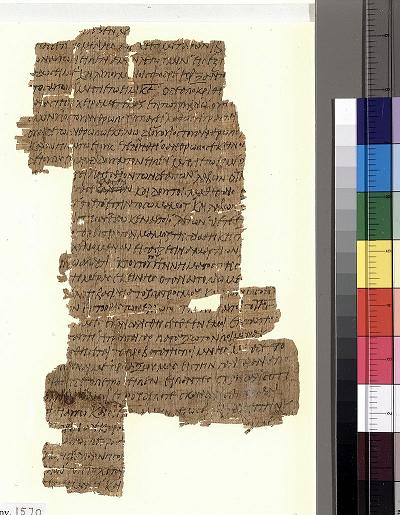| Change to Book/Chapter View |
|
|
|
Translation process is ongoing. For current status see details |
|
|

Papyrus 37 Date: Middle Third Century A.D. Discovered: Purchased in Cairo, Egypt in 1924; probably from Fayum, Egypt. Location: Ann Arbor Michigan, University of Michigan Library Contents: Matthew 26:19-52
Matthew 26 19 The disciples did as Jesus commanded them, and they prepared the Passover. 20 Now
when evening had come, he was reclining at the table with the twelve 22 They were exceedingly sorrowful, and each began to ask him, “It isn’t me, is it, Lord?” 23 He answered, “He who dipped his hand with me in the dish will betray me. 24 The Son of Man goes even as it is written of him, but woe to that man through whom the Son of Man is betrayed! It would be better for that man if he had not been born.” 25 Judas, who betrayed him, answered, “It isn’t me, is it, Rabbi?” He said to him, “You said it.” 26 As
they were eating, Jesus took bread, gave thanks for it, and broke it. He
gave to the disciples and said, “Take, eat;
this is my body.” 27 He
took the cup, gave thanks, and gave to them, saying, “All
of you drink it, 28 for this is my blood of the 30 When they had sung a hymn, they went out to the Mount of Olives. 31 Then Jesus said to them, “All of you will be made to stumble because of me tonight, for it is written, ‘I will strike the shepherd, and the sheep of the flock will be scattered.’ 32 But after I am raised up, I will go before you into Galilee.” 33 But
Peter answered 34 Jesus said to him, “Most certainly I tell you that tonight, before the rooster crows, you will deny me three times.” 35 Peter said to him, “Even if I must die with you, I will not deny you.” All of the disciples also said likewise. 36 Then Jesus came with them to a place called Gethsemane, and said to his disciples, “Sit here, while I go there and pray.” 37 He took with him Peter and the two sons of Zebedee, and began to be sorrowful and severely troubled. 38 Then he said to them, “My soul is exceedingly sorrowful, even to death. Stay here and watch with me.” 39 He went forward a little, fell on his face, and prayed, saying, “My Father, if it is possible, let this cup pass away from me; nevertheless, not what I desire, but what you desire.” 40 He
came to the disciples and found them sleeping,
and said to Peter, “What, couldn’t you watch with me for one
hour? 41 Watch and pray,
that you don’t 42 Again,
a second time he went away and prayed, saying, “ 43 He came 47 While he was still
speaking, behold, Judas, one of the
twelve, came, and with him a great multitude with swords and
clubs, from the chief priests and elders of the people. 48 Now
he who betrayed him had given them a sign,
saying, “Whoever I kiss, he is the one.
Seize him.” 49 Immediately he came to Jesus, 50 Then they came and laid hands on Jesus, and took him. 51 Behold, one of those who were with Jesus stretched out his hand and drew his sword, and struck the servant of the high priest, and cut off his ear. 52 Then Jesus said to him, “Put your sword back into its place, for all those who take the sword will die by the sword.
|
How to read these pages: • The
translation to the left is based on the World English Bible. Words in regular
black font are words in the manuscript matching the Majority Text for that
passage. • Words
in italics cannot be seen in the manuscript, since the manuscript is
fragmentary. These words are supplied for readability by the World English
Bible translation. • Words
present in the manuscript but with some letters unreadable or missing are in blue
like this: blue. One Greek word often is
translated into multiple English words, and when this occurs, all the English
words are in blue. • Words
present in the manuscript but with spelling or trivial word order differences that do not affect the
meaning are in green like this: green. • If
the manuscript is different from the Majority Text, words in the Majority
Text that are missing from the text of the manuscript are marked through in red
like this: • If the manuscript is different from the Majority Text, words in the manuscript that are not in the Majority Text are underlined in red like this: new words.If the manuscript differs from the Majority Text yet matches another well-known text, this is noted in the footnotes.
|
